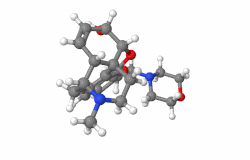
Back فولکودین AZB Φολκωδίνη Greek فولکودین Persian Folkodiini Finnish Pholcodine French Folkodin Croatian Folcodina Italian Folkodyna Polish Folcodina Portuguese Folkodin Serbo-Croatian
 | |
 | |
| Clinical data | |
|---|---|
| Trade names | Logicin, others |
| AHFS/Drugs.com | International Drug Names |
| Addiction liability | High |
| Routes of administration | By mouth |
| ATC code | |
| Legal status | |
| Legal status |
|
| Pharmacokinetic data | |
| Bioavailability | Maximum plasma conc. attained 4-8 hours after oral dose. |
| Protein binding | 23.5% |
| Metabolism | Liver |
| Elimination half-life | 32-43 hours; volume of distribution is 36-49L/kg. |
| Excretion | Kidney |
| Identifiers | |
| |
| CAS Number | |
| PubChem CID | |
| DrugBank | |
| ChemSpider | |
| UNII | |
| KEGG | |
| ChEBI | |
| ChEMBL | |
| CompTox Dashboard (EPA) | |
| ECHA InfoCard | 100.007.367 |
| Chemical and physical data | |
| Formula | C23H30N2O4 |
| Molar mass | 398.503 g·mol−1 |
| 3D model (JSmol) | |
| |
| |
Pholcodine is an opioid cough suppressant (antitussive). It helps suppress unproductive coughs and also has a mild sedative effect, but has little or no analgesic effects. It is also known as morpholinylethylmorphine and homocodeine.
Pholcodine is found in certain cough lozenges,[2] and more commonly as an oral solution, typically 5 mg / 5 ml. Adult dosage is 5-10 ml up to 3-4 times daily.[3] Pholcodine now largely replaces the previously more common codeine linctus, as it has a much lower potential for dependence.
Pholcodine has been widely used as an antitussive agent but by 2023 concerns over its association with anaphylaxis in some circumstances meant that it has been withdrawn from sale in many territories. Pholcodine is not prescribed in the United States where it is classed as a Schedule I drug, the most highly controlled drug category.[4]
Following the conclusion of a review of post-marketing safety data by the MHRA, all pholcodine-containing medicines are being recalled and withdrawn from the UK as a precaution.[5] The available data has demonstrated that pholcodine use, particularly in the twelve months before general anesthesia with NMBAs (neuromuscular blocking agents), is a risk factor for developing an anaphylactic reaction to NMBAs. In December 2022, the European Medicines Agency recommended their withdrawal in the EU.[6] As of February 2023[update], the Australian Therapeutic Goods Administration canceled the registration of pholcodine.[7][8]
- ^ Anvisa (31 March 2023). "RDC Nº 784 - Listas de Substâncias Entorpecentes, Psicotrópicas, Precursoras e Outras sob Controle Especial" [Collegiate Board Resolution No. 784 - Lists of Narcotic, Psychotropic, Precursor, and Other Substances under Special Control] (in Brazilian Portuguese). Diário Oficial da União (published 4 April 2023). Archived from the original on 3 August 2023. Retrieved 3 August 2023.
- ^ "Potter's Pholcodine cough pastilles". Lloyds Pharmacy. Archived from the original on 29 February 2020. Retrieved 29 February 2020.
- ^ British National Formulary 54. London: BMJ Publishing Group Ltd., RPS Publishing. 2007. p. 175.
- ^ "Legislation - Controlled Substances". U.S. Food and Drug Administration (FDA). 11 June 2009. Archived from the original on 4 February 2016.
- ^ "Pholcodine-containing cough and cold medicines: withdrawal from UK market as a precautionary measure". GOV.UK. 23 March 2023. Archived from the original on 11 November 2023. Retrieved 11 November 2023.
- ^ "EMA recommends withdrawal of pholcodine medicines from EU market". European Medicines Agency (EMA). 2 December 2022. Archived from the original on 8 February 2024. Retrieved 8 February 2024.
- ^ "Pholcodine". Therapeutic Goods Administration (TGA). 28 February 2023. Archived from the original on 18 May 2024. Retrieved 18 May 2024.
- ^ "About pholcodine cough medicines cancelled by the TGA and recalled from pharmacies for safety reasons". Therapeutic Goods Administration (TGA). 1 March 2023. Archived from the original on 18 May 2024. Retrieved 18 May 2024.